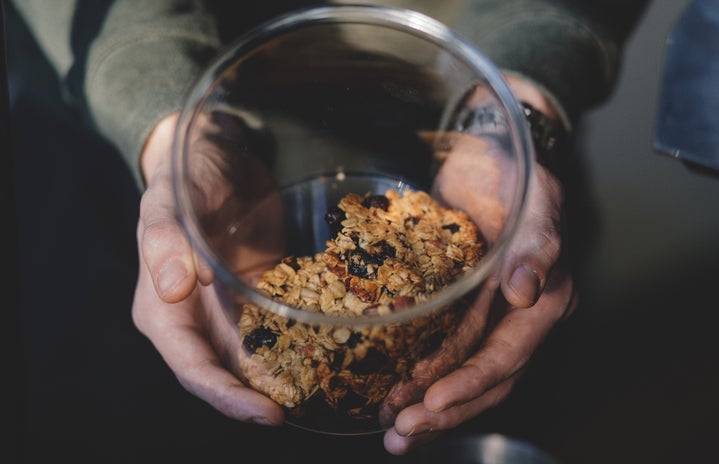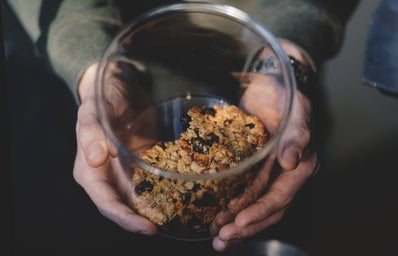I recently found myself eating dinner with friends at a macrobiotic, vegan, Japanese restaurant because it was the only place that could accommodate each of my friends’ dietary restrictions. One cut out carbs years ago to lose weight, another is pursuing a vegan diet to stay thin. When my boyfriend asked for sugar with his tea, the waitress admonished him and offered all-natural maple syrup instead. Since when did diets become so complicated?
Using eating excuses to lose weight – like eating gluten-free regardless of whether you have Celiac Disease – is becoming a common practice on college campuses. We turned to Connie Diekman, Registered Dietitian, past president of the Academy of Nutrition and Dietetics, and Director of University Nutrition at Washington University in St. Louis to learn more.
Do eating excuses lead to weight loss?
Eating excuses are popular on college campuses because they seem like a quick fix – just cut out a certain food group and bam, you’ll be able to zip up your sorority formal dress again…right? Not quite. According to Diekman, “These diets will often lead to weight loss, but are the girls healthy once they’ve lost the weight? The answer, of course, often is no. They are missing some key nutrients. In addition, it is possible that they have lost muscle mass, not fat mass, so they might be a lower weight, but not a healthier weight.”
While the weight might come off for a short period of time, you’re not likely to maintain your weight loss in the long run.
Why are girls choosing to diet this way?
When JoEllen, a recent grad of Tulane, wanted to lose ten pounds, she turned to the Internet for research. She discovered sources claiming that gluten and dairy caused weight gain and acne, the two body issues she struggled with most. Despite negative allergy tests to both gluten and dairy, she says, “I genuinely believed that these two products were the root of all my body issues. I even told a number of my friends that I couldn’t go out to dinner since I ‘found out’ I was allergic to these products.” Although she maintained her diet for months, she never lost the ten pounds.
Of course, it’s completely normal to try a low-carb or low-fat diet to drop a few pounds or to maintain your weight. And no one would ever criticize girls who exclude gluten, dairy, sugar, or any other type of food for medical reasons, such as Celiac Disease, lactose intolerance, or diabetes. But there does seem to be a trend of girls who have adopted these eating practices in order to lose weight drastically or revamp their whole lifestyle – these aren’t girls looking to drop just five pounds.
Diekman, who consults college girls about nutrition on the Washington University in St. Louis campus, says, “As I see patients here on campus, there does seem to be an increase in girls who are using an acceptable diet – vegetarian being the big one – to justify their need to lose weight due to body image concerns.”
It’s not just girls on college campuses who are eating this way. Open any tabloid and you’ll see celebs praising their new diet du jour, whether it’s Miley Cyrus cutting out gluten or Beyonce’s famous Master Cleanse. Veganism, too, is taking Hollywood by storm. Lea Michele, Olivia Wilde, and even Betty White stick to vegan diets. Does their influence – and enviable bodies (hey, if we can look like Betty when we’re ninety, we’ll be happy!) – have something to do with college girls turning vegan?
“[The trend] also ties into what they see occurring with celebrities who try these diets and lose weight,” confirms Diekman.
What should you tell your friends?
For many girls, it’s easier to adopt a certain eating excuse and stick to it rather than explaining to friends that they’re trying to lose weight or that they’re working on limiting certain foods, especially when dieting comes with a stigma. According to a 2012 survey by Glamour, thin women are viewed as “conceited” or “superficial” eight times as often as heavy women, “vain” or “self-centered” four times as often, and “bitchy,” “mean,” and “controlling” more than twice as often. Women are quick to judge others; it’s no fun to get slapped with the “bitch” label just because you’re trying to slim down.
Diekman explains, “Following a diet for a medical reason is much more acceptable than trying to lose weight when you don’t need to.”
University of Virginia student Katrina adds, “It sounds obnoxious to say, ‘I’m not eating carbs.’ Sometimes, if I want to eat healthier in a restaurant, I’ll tell them I’m gluten-intolerant because it’s easier to say than, “I don’t want any bread in my product.’ It’s like a politer way of dealing with the idea of cutting carbs out of your diet.”
It can be embarrassing to admit that the Freshman 15 got the better of you and that you’re trying to diet. Offering a medical excuse – whether real or not – can cover up your efforts to diet and simply put the focus on healthy eating. Next time your friends ask why you’re passing on ice cream, be straightforward but brief. There’s the all-purpose, “I’m trying to eat healthier,” or you can get more specific:
- “Carbs/dairy/sugar makes me feel sluggish.”
- “I’ve always wanted to try going vegan. I’m not sure I’ll stick with it, but I’m trying it for now.”
- “I feel like I have more energy when I stick with healthier foods.”
Are eating excuses a form of disordered eating?
Disordered eating is used to describe an array of eating behaviors that aren’t quite severe enough to be considered full-blown anorexia or bulimia, but definitely aren’t healthy, either. “There is no question that [eating excuses] often reflect disordered eating and can result in limited nutritional intake,” says Diekman.
The problem with this method of eating is that it’s highly possible that, by removing one or more food groups from your diet, you’re not taking in enough nutrients. According to Diekman, “College-age women need to meet their nutrient needs by consuming adequate whole grains, vegetables and fruits with the appropriate amounts of healthy fats, low-fat or fat-free dairy, and lean protein choices.”
How to do it the healthy way
While gluten-free and vegan diets can be excuses for disordered eating, that doesn’t mean they aren’t safe, legitimate diets in their own rights. “Vegetarian diets, including vegan can definitely be healthy if well-planned; the same applies to gluten-free,” says Diekman. She suggests consulting with a registered dietitian to learn how to safely balance a diet that excludes one or more food groups.
Nicole, a vegan and student at New York University, says, “I chose to go vegan after reading a book called Eat To Live last year. I found that when I cut out animal products and ate mostly green vegetables, fruits, beans, and nuts, I lost weight right away and felt so much better. But a word of advice: healthy veganism doesn’t mean potato chips and starchy grains. It means more nutrient-dense, natural foods.” Nicole’s diet is healthy and safe because she focuses on getting a wide variety of nutrients she needs – not because she’s cutting out food groups for fun.
Regardless of whether you’re a strict vegan or a strict potato chips-only kind of girl, it’s crucial to take a good look at your eating habits and make sure you’re taking in enough nutrients. You probably haven’t looked at the food pyramid since middle school health class, but take another look. The updated pyramid is customizable to your height, weight, and lifestyle, and provides recommendations for how much of each food group you should be eating. If you’re considering cutting out a food group – whether for medical reasons or simply to lose weight – you should talk to a nutritionist about creating a balanced diet.

